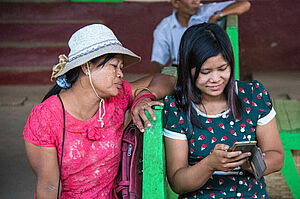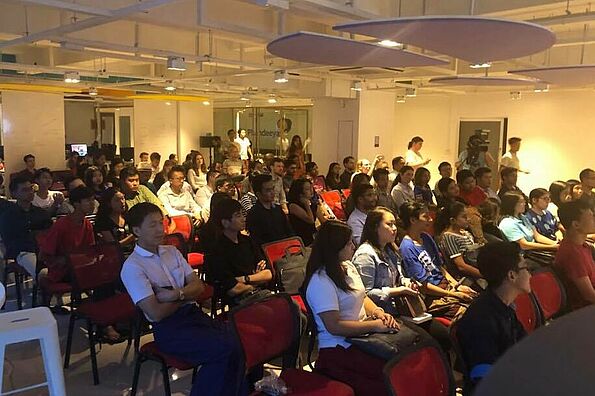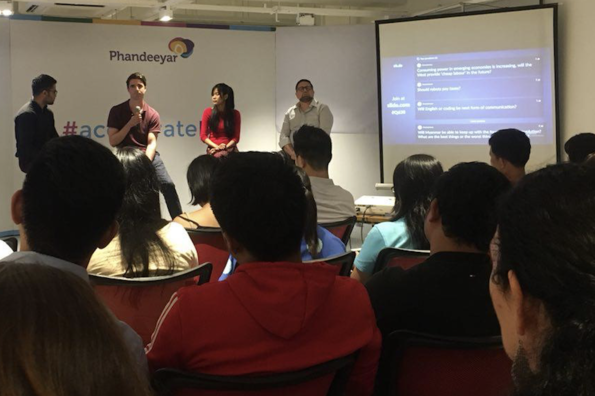Riding the wave: Technology for change in Myanmar

Internet use and mobile phone penetration have jumped over the past decade in Myanmar, while affordability of IT devices and limited digital literacy prevents a large proportion of the population from riding the digital wave.
Phandeeyar, an innovation lab located in central Yangon, has been promoting technology for change and development in the country since 2014 (link). At a July event co-hosted by the Friedrich-Ebert-Stiftung (FES) in Myanmar, the organization presented Yangon-based audiences with a discussion on the impact of technology and digitalization on traditional ideas of work and social values.
In 2008 only 0.2 per cent of the Myanmar population could boast internet access. Ten years on, over 26 per cent of the population is online (link). Among them, 85 per cent use smartphones to access the internet (link) as the most affordable option. The catch: to manage data costs mobile operators use zero-rating services—platforms that allow free access, but restrict the websites that are available. As a consequence, internet access becomes limited to single or very few platforms, leading to the tech giant Facebook becoming the only internet experience for a majority of users in Myanmar.
Despite this curbed access to digital content and information technology as resource to a majority of Myanmar users, organization like Phandeeyar have persisted in their mission. On occasion of the July event with the FES Myanmar office, FES Connect spoke to the Phandeeyar team about the challenges and prospects of digitalization and the use of technology for positive social change in the country.
How has digital literacy faired under conditions of booming internet use and mobile phone penetration in the country?
Despite a smartphone penetration rate of around 80 per cent of the population in Myanmar, both digital and media literacy lags well behind. Overall there is a low level of understanding of how to stay safe online, including the use of secure passwords and not revealing personal information. For many people in Myanmar, Facebook is the internet, so when low levels of digital and media literacy interact with the sorts of hate speech and disinformation campaigns we have seen on Facebook, terrible things can happen.
Phandeeyar empowers local Civil Society Organizations to provide digital and media literacy trainings and workshops around Myanmar that teach people basic internet and media literacy skills so that they can make more informed choices about how to use the internet and consume the content that they see online.
How do you use technology and digitalization to help organizations generate change in Myanmar?
Phandeeyar is spearheading the development of Myanmar’s tech and innovation ecosystem in a number of ways. We launched Myanmar’s first-ever startup accelerator, providing funding and training for tech startups and the expanding pool of tech talent in Yangon and around the country. In addition, Phandeeyar also helps change agents—civil society organizations, civic and social entrepreneurs, and independent media—use technology to increase the impact of their work. For example, Phandeeyar is helping drive the open-data movement here in Myanmar through Open Development Myanmar, an interactive open-data portal full of easily accessible information about Myanmar.
Many, including Nobel Laureate and economist Joseph E. Stieglitz, claim that modern technology can also be an efficient means of labour exploitation. What can be done to prevent this?
New technologies might have some chilling effects on global labour markets, including Myanmar, due to automatization, where fewer workers are needed in order to perform basic tasks. However, here at Phandeeyar we observe technology as having very positive effects on workers’ lives. For instance, multiple app-based startups have recently launched online platforms that allow employees to directly find suitable and vetted employers. This offers, especially for workers in the vast informal sector here in Myanmar, the chance to sign up with employers that are being held accountable to international labour standards.
###
For more information on the work by FES in Myanmar visit the country office website and follow their Facebook fan page for daily updates.














